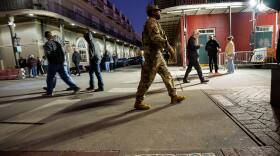A federal judge has again ordered prison officials to protect incarcerated men from heat on a work detail at Louisiana's largest prison, finding the men are at "substantial risk of suffering serious harm" under current practices.
The decision marks the second time inside of a year that Louisiana Middle District Judge Brian A. Jackson has said corrections officials must boost heat precautions on the "farm line" at Louisiana State Penitentiary, the prison best-known as Angola. It comes as part of a sweeping lawsuit posing a challenge to the work assignment.
Jackson's ruling grants a request for a temporary restraining order, saying the prison must monitor the heat index on the "farm line" every 30 minutes and issue a heat alert when it hits 88 degrees. That triggers mitigating measures such as a schedule for water and breaks.
In the 38-page order, Jackson wrote that he found an expert hired by the state prison system to defend its heat policies "wholly uncredible." He chided the system and its officials for raising its heat alert threshold over the course of the lawsuit.
"Defendants chose to increase the heat alert threshold from 88 to 91 degrees Fahrenheit after the Court ordered Defendants to improve conditions on the Farm Line to preserve human health and safety," Jackson wrote.
A prison system spokesperson says the department will comply with the order, but that the agency does not typically comment on pending litigation. Attorneys representing the prison system have filed notice that they will appeal the ruling, records show.
Lydia Wright, a supervising attorney with Rights Behind Bars representing the plaintiffs, hailed the ruling in a statement, noting it's the second time the court "condemned" Angola "for perpetuating an archaic system of physical punishment that contradicts scientific understanding and basic legal principles.”
“There is no justifiable reason for Angola to continue operating the Farm Line," she added.
The lawsuit was first filed in 2023 and names a group of incarcerated men and the grassroots group Voice of the Experienced, which is led by formerly incarcerated people, as plaintiffs. Advocacy groups including the Promise of Justice Initiative and Rights Behind Bars are litigating the case.
In their legal filings and court testimony, plaintiffs describe the "farm line" as involving painstaking agricultural work such as harvesting okra, corn and potatoes by hand, often in brutal Louisiana heat and humidity.
That puts workers, including those with disabilities, at risk of physical and psychological trauma, they allege. They argue that forced field work overseen by "gun guards," taking place on the grounds of a former plantation, all while getting paid a few cents an hour, is akin to slavery.
Prison officials and the state, meanwhile, maintain the "farm line" is crucial to Angola operations. They've said they worked to improve conditions by constructing shade trailers, and that incarcerated people are largely in control of how fast they work, their drinking water and breaks.
Some improvements cited by the prison officials responded to the first round of orders from Jackson last summer, when the judge first said the prison system must add more safeguards for people working in the fields.
While some of those orders were paused by a higher court, others, such as providing free sunscreen and offering the new shade structures, were implemented, according to testimony in a three-day hearing in the case in Baton Rouge last month.
During that hearing, incarcerated men, experts and prison officials testified about the "farm line" so the judge can weigh a request to certify the case as a class action lawsuit.
Lawyers from both sides also lodged arguments about the temporary restraining order and a separate request for a preliminary injunction to offer even more stringent heat protections. Rulings on the preliminary injunction and the class-action status are still pending.
If approved, the class would apply to people working the "farm line" and anyone who could be assigned there, which plaintiffs contend encompasses almost all of Angola's population — roughly 4,000 men — or a subclass of people with disabilities.
Jackson's latest opinion commanding heat precautions cited a medical expert hired for the plaintiffs, Dr. Susi Vassallo, who said healthy people could be endangered by ongoing exposure to heat indices above 88 degrees, including potential organ damage and chronic issues.
"Defendants simply ignored these compelling medical findings," the judge wrote.
Jackson also has said he would like to personally visit Angola to observe conditions on the "farm line." Evidence of that visit having taken place does not appear in the court record.
Rulings on heat protections in the "farm line" case add to a slate of federal court decisions that have found that prisons must take more steps to protect incarcerated people from heat.
That includes a recent decision in March, when a Texas federal judge found "plainly unconstitutional" heat in the Lone Star State's prisons, but stopped short of ordering air conditioning, reports said.
Criminal justice advocates say scrutinizing heat in prisons is particularly important as the climate changes. The "farm line" case weaves that argument into legal pushback against forced prison labor, another issue which courts around the South and the country are grappling with.
Several of the incarcerated men involved in the "farm line" case have written in legal filings that being forced to work in this manner touches their historical consciousness as men of color.
While he sees white men locked up at Angola assigned to jobs as clerks or in maintenance, "Black men, we're in the field," one incarcerated man, Darrius Williams, wrote in a sworn declaration filed in the case.
"We are forced at gunpoint to scrounge in the dirt. We must squat and bend, sometimes for hours. Our joints ache. Our skin tears on the spines of squash and okra plants. We are told to go faster, work harder," he wrote.
This story was produced by the Gulf States Newsroom, a collaboration between Mississippi Public Broadcasting, WBHM in Alabama, WWNO and WRKF in Louisiana and NPR.












